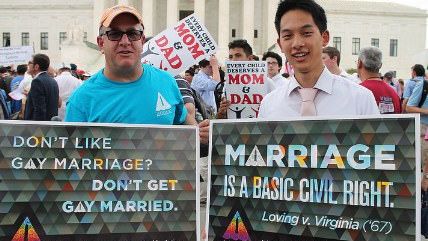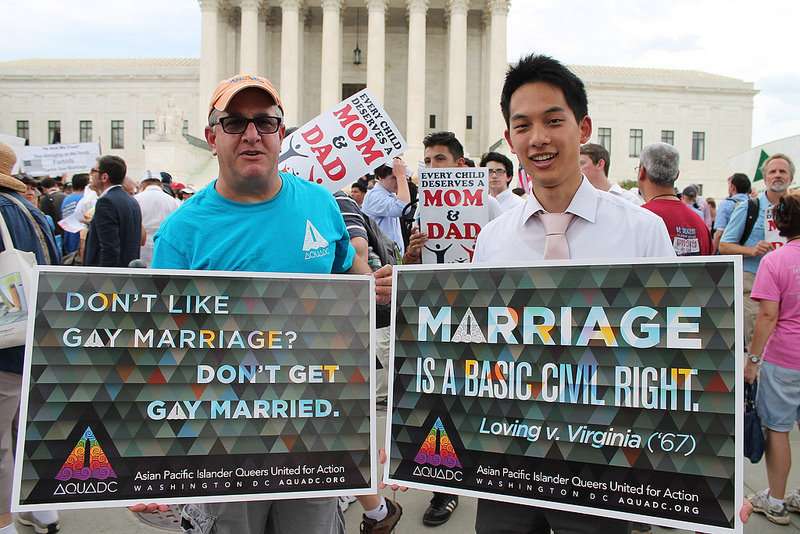Signaling from the Supreme Court: Justices Mostly Show Their Cards on Gay Marriage
Kennedy maintains reputation as the swing vote, but seems to be leaning toward yes.


Predictably, early reports about today's Supreme Court arguments on same-sex recognition paint a divided court. The more liberal members of the court had tough questions for states who want to preserve same-sex marriage bans and the justifications for them. The conservatives had tough questions about whether the courts should be overruling state decisions on marriage regulations.
Justice Anthony Kennedy, long described as a swing vote on gay issues, worried about changing a definition of marriage that has been the same for "millennia," but was nevertheless very concerned about preserving the dignity of the relationships between gay couples and families.
To backtrack just slightly for some background perspective. Today, the Supreme Court is considering two questions: One, whether states are required to recognize same-sex marriages; and two, whether states are required to recognize same-sex marriages legally performed in other states. The Supreme Court blocked off much more time to hear this case than they normally do.
The case, Obergefell v. Hodges, is actually the name given to a consolidation of several cases from four states where the federal courts have upheld gay marriage recognition bans, thus creating disagreement with all the other federal courts who have struck gay marriage bans down in many other states.
Over at Bloomberg View, Noah Feldman has some good analysis of the signaling from the Supreme Court justice comments and questions from early in the arguments today. This might be an important indication of where Kennedy may ultimately come down, despite his worries about changing the definition of marriage:
Kennedy went on to say that the amount of time between Lawrence v. Texas, the 2003 decision he wrote recognizing a fundamental right to have sex with a partner of one's choice, and the current case was roughly the same as the amount of time between Brown v. Board of Education (1954) and Loving v. Virginia (1967). The Loving decision is the aptly named case in which the court struck down a ban on interracial marriage.
Justice Antonin Scalia was more concerned that a minister would be obligated to perform or solemnized a same-sex marriage ceremony and wanted reassurance this would not be the case. Justice Samuel Alito broached the issue of polygamy and whether the court would be heading down that path. Lawyer Mary Bonauto, representing the gay couples in the suit, responded to the polygamy concern by mentioning all the legal disruption group marriages would raise in the courts (like who would make medical decisions, managing child custody, and how divorce would work out). Chief Justice John Roberts bluntly said the plaintiffs were seeking to change how the institution of marriage was recognized and was concerned about the potential impact of shutting down state-level debate with a ruling.
This was all the focus of the first question, and Bonauto ended her arguments with a very libertarian position: "In terms of the question 'Who decides?' it's not about the court versus the states. It's about the individual making the choice to marry and whom to marry, or the government."
John Bursch, representing the states fighting to keep their ban, was faced with skepticism from the more liberal Justices Elena Kagan and Stephen Breyer. The states' position is that recognition of gay marriage undermines traditional marriages and then bonds between straight couples would not be maintained and we wouldn't have children anymore. The justices pretty much asked him a lot of the same questions that everybody else brings up in this sort of debate: Do heterosexuals who can't or don't want to have children have the right to get married? Kennedy brought up the ability of gay couples to adopt, which seems to be the justice showing a little bit more of where he might come down.
In fact, when it came to the second question (Do states have to recognize legal gay marriages from other states?), SCOTUSBlog reported that Kennedy said little. In their liveblog of the arguments, one of them speculated that that this may well be a sign of where Kennedy is coming down. The second question is only relevant if the majority decides against requiring all states to recognize gay marriages. Kennedy's lack of engagement may indicate that he will be voting affirmatively for gay marriage recognition across the board, concerns about the historical definition of marriage notwithstanding.
By contrast, the more conservative judges were much more critical about whether the states could refuse to recognize other states' gay marriages. It was Justice Scalia who invoked the Constitution's Full Faith and Credit clause, which would seem to indicate that he thinks states might have to recognize other states' gay marriages. Several of the justices wondered if the state control argument meant states could refuse to acknowledge all marriages from another state.
That conservatives like Roberts and Scalia jumped on question two seemingly on the same side as the more liberal members is a pretty good explanation of why this question was even asked. If there isn't a majority to support full nationwide recognition on question one, there was the possibility of getting conservatives on board with a compromise via question two. States would still be able to ban gay marriage recognition for weddings within their state. But they would have to recognize gay marriages performed in other states. In a roundabout fashion, this essentially also legalizes gay marriage, because gay couples could just go to another state for the ceremony. It would, however, preserve some sort of sense of state internal control of wedding licensing, no matter how thin and symbolic it is.
If Kennedy truly is the swing vote, though, it does appear to be more likely that the court will strike down bans entirely. We'll find out when the court gives its ruling, expected in June.
Audio for the arguments about the first question is already available here. The Wall Street Journal has a pretty thorough liveblog (particularly of the later arguments that have been ignored in favor of quick news story turnaround) here.


Show Comments (402)